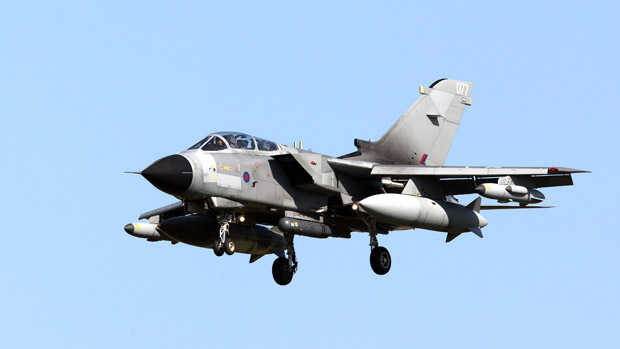Islamic State: RAF jets carry out first air strikes in Iraq
Attacks will prompt 'relief' for government after fanfare of air strikes vote, but 'anxiety' for hostages

A free daily email with the biggest news stories of the day – and the best features from TheWeek.com
You are now subscribed
Your newsletter sign-up was successful
Obama boosts US military presence in Iraq
13 Aug
The US has sent 130 more military advisers to northern Iraq, who will join around 250 American military advisers already in the country.
A US defence spokesman says the marines and special operations forces will assess the humanitarian situation in the Kurdish region but will not be engaged in combat, the BBC reports.
The Week
Escape your echo chamber. Get the facts behind the news, plus analysis from multiple perspectives.

Sign up for The Week's Free Newsletters
From our morning news briefing to a weekly Good News Newsletter, get the best of The Week delivered directly to your inbox.
From our morning news briefing to a weekly Good News Newsletter, get the best of The Week delivered directly to your inbox.
"This is not a combat boots on the ground kind of operation," said US defence secretary Chuck Hagel. One official tells The Guardian that the troops' mission could last less than a week.
The move comes after fighters from the militant group Islamic State, formerly known as Isis, forced tens of thousands to flee their homes. The UN says tens of thousands of civilians, including members of the Yazidi sect, are trapped on Mount Sinjar by Islamic State fighters and need "life-saving assistance".
Since June it has sent about 700 military personnel to Iraq to protect diplomats there and assess the country's military capacity.
It has reportedly begun supplying weapons to the Kurdish forces, known as Peshmergas, who have been fighting Islamic State in the north, and in the past week it has launched a number of air strikes against militants.
A free daily email with the biggest news stories of the day – and the best features from TheWeek.com
A US defence official said the government will continue to explore ways to support "Iraqis affected by the ongoing fighting in Sinjar" and to prevent "potential acts of genocide" by Islamic State.
Islamic State: success for Kurds amid Yazidi slaughter in Iraq
11 Aug
Kurdish forces in northern Iraq have reported successes on the ground, amid claims of mass slaughter by Islamic State militants.
The US has launched four rounds of air strikes targeting the militants near Irbil, the capital of Iraqi Kurdistan, enabling Kurdish fighters to retake the towns of Gwer and Makhmur.
It comes as Baghdad officials reported "striking evidence" that Islamic State militants had murdered at least 500 Yazidis, who they regard as "devil worshippers", and abducted hundreds of Yazidi women.
Mohammed Shia al-Sudani, Iraq's human rights minister, said militants celebrated the massacre by cheering and waving weapons over corpses. "Some of the victims, including women and children, were buried alive in scattered mass graves," he said.
The Guardian says more than 20,000 of the 40,000 Yazidis trapped by jihadists on Mount Sinjar have escaped with the help of Kurdish rebels from Syria. The US is said to be "reviewing options" for removing the remaining people trapped on the mountain.
Meanwhile, Iraqi Prime Minister Nouri al-Maliki has again refused to cave in to pressure to step down. Special forces loyal to al-Maliki were deployed in strategic areas of Baghdad last night, prompting fears that the political infighting could hamper efforts to stem advances by the militants.
David Cameron, who is on holiday in Portugal, is under pressure from Tory backbenchers to recall parliament to discuss military action. The UK has joined the US in air dropping humanitarian supplies to Yazidis in the Sinjar mountains, but Cameron's critics say this is not enough.
In The Times, David Aaronovitch says the slaughter in Iraq and Syria is reminiscent of Hitler's SS in occupied eastern Europe. "Just like the SS, Isis men will kill more and more, will be more unconstrained in their savagery, stopping only when they are utterly defeated and every executioner... is dead or tried," he says. "Any politician's talk that does not envisage this defeat is wasted breath."
Obama authorises airstrikes on Islamic State fighters in Iraq
08 Aug
US President Barack Obama has authorised targeted airstrikes in Iraq, where Islamic State militants are persecuting tens of thousands of Yazidis.
The Sunni Muslim fighters, formerly known as Isis, have been advancing across northern Iraq since June.
More than 40,000 Yazidis have fled to a mountain in north-west Iraq, where they face massacre at the hands of the militants if they come down or death from thirst and hunger if they do not.
Speaking at the White House last night, Obama announced two operations: to protect American personnel in Iraq and save the trapped Yazidis.
His speech came as militants edge towards the city of Irbil, where US military personnel and diplomats are based. "To stop the advance on Irbil, I've directed our military to take targeted strikes against [Islamic State] terrorist convoys should they move toward the city," said Obama.
The president emphasised that he would not allow the US to be "dragged into fighting another war in Iraq" and said the country "cannot and should not intervene every time there is a crisis in the world".
Instead, he insisted the US was acting to prevent "a potential act of genocide". Militants have called for the "systematic destruction of the entire Yazidi people, which would constitute genocide", he said.
The US has been carrying out humanitarian food and water airdrops on the mountain and providing assistance to the Iraqi government and Kurdish forces to help them fight off the Islamic State.
Obama said the "only lasting solution" is reconciliation among Iraqi communities and stronger Iraqi security forces.
As many as 100,000 Christians are believed to have fled their homes ahead of the Islamic State onslaught, says the BBC, with the majority thought to have gone to the autonomous Kurdistan Region. With the aim of creating an Islamic caliphate, militants have been threatening Christians to convert to Islam, pay a religious levy or die.
40,000 Yazidis trapped on mountain as jihadists close in
07 Aug
More than 40,000 Yazidis – members of a minority religious group – have fled to a mountain in north-west Iraq, where they face being massacred by Islamic State militants if they come down or dying of thirst if they do not.
Members of the Yazidi sect, one of Iraq's oldest minority groups, retreated to Mount Sinjar and became stranded when jihadists from the Islamic State surrounded the mountain, The Guardian reports.
Another 130,000 Yazidis are reported to have fled to Dohuk, in the Kurdish controlled north of Iraq, or to Irbil – a town where "regional authorities have been struggling since June to deal with one of the biggest and most rapid refugee movements in decades", the Guardian says.
One man, Khuldoon Atyas, who stayed to look after his family's crops in the traditionally Yazidi town of Sinjar told reporters: "We are being told to convert or to lose our heads. There is no one coming to help."
According to officials at least 500 Yazidis, including 40 children, have been killed in the past week as militants advance through the region.
Unicef reports say that the children died as a "direct consequence of violence, displacement and dehydration".
"Families who fled the area are in immediate need of urgent assistance, including up to 25,000 children who are now stranded in mountains surrounding Sinjar and are in dire need of humanitarian aid, including drinking water and sanitation services," Unicef said.
Yazidis follow an ancient faith that many jihadists consider to be "devil worship", the BBC reports.
Many Yazidi towns are now believed to be under the control of the Islamic State, the group formerly known as Isis. Militants have also launched attacks on territory controlled by the autonomous Kurdistan region. Kurdish forces, known as Peshmerga, say they are planning retaliatory attacks. A weekend push by the Pershmerga led to Nouri al-Maliki offering air support in "the first sign of co-operation between Baghdad and the Kurdish region since Iraq's second-largest city, Mosul, was taken over by IS in June", the BBC says.
Islamic State militants swept across vast swathes of northern Iraq in June, seizing weapons and declaring the land they now control to be a new "caliphate".
-
 Political cartoons for February 11
Political cartoons for February 11Cartoons Wednesday's political cartoons include erasing Epstein, the national debt, and disease on demand
-
 The Week contest: Lubricant larceny
The Week contest: Lubricant larcenyPuzzles and Quizzes
-
 Can the UK take any more rain?
Can the UK take any more rain?Today’s Big Question An Atlantic jet stream is ‘stuck’ over British skies, leading to ‘biblical’ downpours and more than 40 consecutive days of rain in some areas
-
 Epstein files topple law CEO, roil UK government
Epstein files topple law CEO, roil UK governmentSpeed Read Peter Mandelson, Britain’s former ambassador to the US, is caught up in the scandal
-
 Iran and US prepare to meet after skirmishes
Iran and US prepare to meet after skirmishesSpeed Read The incident comes amid heightened tensions in the Middle East
-
 Syria’s Kurds: abandoned by their US ally
Syria’s Kurds: abandoned by their US allyTalking Point Ahmed al-Sharaa’s lightning offensive against Syrian Kurdistan belies his promise to respect the country’s ethnic minorities
-
 Israel retrieves final hostage’s body from Gaza
Israel retrieves final hostage’s body from GazaSpeed Read The 24-year-old police officer was killed during the initial Hamas attack
-
 China’s Xi targets top general in growing purge
China’s Xi targets top general in growing purgeSpeed Read Zhang Youxia is being investigated over ‘grave violations’ of the law
-
 Syria’s Islamic State problem
Syria’s Islamic State problemIn The Spotlight Fragile security in prison camps leads to escape of IS fighters
-
 Panama and Canada are negotiating over a crucial copper mine
Panama and Canada are negotiating over a crucial copper mineIn the Spotlight Panama is set to make a final decision on the mine this summer
-
 Why Greenland’s natural resources are nearly impossible to mine
Why Greenland’s natural resources are nearly impossible to mineThe Explainer The country’s natural landscape makes the task extremely difficult